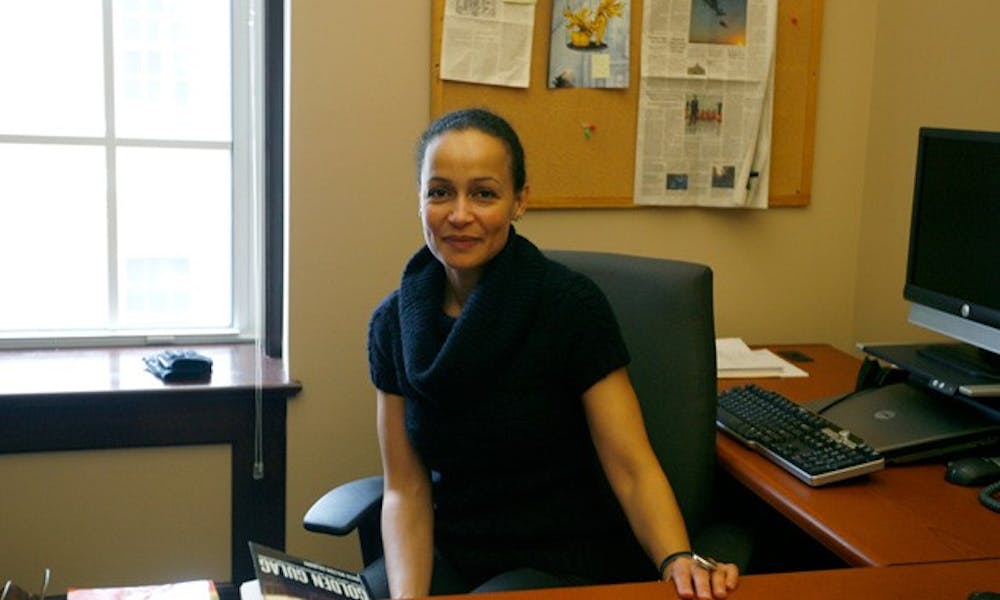Anne-Maria Makhulu was never much of a couch potato and had never seen The Wire. But when at a conference a few years ago she overheard mentor Judith Halberstam, an English professor at the University of Southern California, having an animated conversation about the show, she decided that it must be worthy of a viewing. She took it with her as her only company while finishing a book manuscript in New York City. And it was then that she thought she had to teach a course on this.
When she returned to Durham, she expressed her interest in teaching the course at a faculty meeting and was greeted with an enthusiastially positive reaction. That response was validated by the course’s high enrollment in its first semester of being offered.
“For me, as an anthropologist, The Wire is incredibly socially robust. It reveals a world with all of its [connections],” Makhulu says, channeling Halberstam’s enthusiasm.
In a recent interview on Up Front with Tony Cox, Makhulu and Jason Mittell, a professor of American studies and media culture at Middlebury College, discussed the television program’s use in classrooms. Mittell emphasized how it brings together seemingly disparate worlds.
The extraordinary social imagination of head writers David Simon and Ed Burns portrays oft-ignored issues in an accessible way, encouraging conversations that were only whispers before.
“Most of us are teaching this as a ploy,” admits Makhulu. “Not to be deceitful, but to appeal to students to think about very difficult issues.”
The course is in the catalogs at the University of California—Berkeley, Middlebury and Harvard, though each iteration has a different curriculum. At Berkeley, renowned feminist scholar and author of Hardcore Linda Williams teaches it from a more literary perspective, asking the question, what is so great about The Wire?
On the first day of class, Makhulu was up-front with her intentions and told her students that the course was not a television course. Instead, the series would be a new medium through which she would do her pedagogical work—the same work she had been doing for years.
Senior Marcus Andrew says he was excited for the course and its curriculum. Having grown up in Washington, D.C., he was aware of similar issues.
“The nature of The Wire is that is multifaceted,” Andrew explains. “There’s a lot of depth. A lot of different issues at different levels.”
The subject matter is heavy, and it is obvious that many students are tentative when offering their opinions. The occasional comment from the back of the classroom is said with a strained voice, as students struggle to voice controversial points of view.
But this isn’t to say that students aren’t interested. The faces in the classroom are ever-changing, as many unenrolled undergraduate and graduate students will occasionally sit in on the hour-long class.
“I have a lot of floaters,” she says, cringing at the predictably of using a term borrowed from The Wire. But that is precisely what makes the series such an effective medium—its ability to resonate after the closing credits.
Makhulu is obviously passionate about her work, physically composed yet unable to contain the excitement in her South African-accented voice. Her words fill the most distant corner of the classroom in the Carr Building on East Campus, as she grasps her podium in an attempt to control her gesticulations. She is genuinely enthused not only by the show, but by the conversation she is having with her students as well. She elicits their perspectives with sincere interest, offering her own with humbled honesty.
“There are moments of enlightenment, learning going on in both directions,” Makhulu says, thinking of her own growth throughout the course.
The course is taught in one of the darker rooms, with windows facing south and the blinds pulled down halfway, ideal for a mid-morning nap. But looking around the room, the eyes are wide-open and alert. Some questions posed by Makhulu incite mini-discussions amongst the students, though it is obvious by their reaction that the clips garner the most attention. But the silence of unsure opinions does not intimidate Makhulu, who continues in her attempts to encourage the students.
Sitting in her office, she considers my inquiry of whether or not the students have a hold of the material.
“There were classes I didn’t get at all the first go around,” recalls Makhulu of her own college experience. “There is a slow process of coming to recognition of things you see in your world every day.”
This appreciation for the slow burn of increased understanding allows the students the necessary time to digest the issues, some more unfamiliar to them than others.
“[Makhulu] said that we can’t subjectively view it, that there is a whole world outside ours and every institution has its own rules and own logic,” Andrew says.
Though the students may each be residents of a different world, Makhulu and The Wire bridge the gap.
“[The issues] are not completely foreign to anybody,” Andrew says, reflecting on class discussions. “Everybody is taking ownership of the issues that we are talking about.”
Explaining her thoughts on the current societal state, Makhulu says the American Dream is now an ideological fiction. She believes that as a society, we find less controversial and more black-and-white explanations more satisfying. She hopes that through the series, people will no longer ignore the difficult issues.
“Until you really know,” Makhulu concludes, “you don’t know what you’re looking at.”
Get The Chronicle straight to your inbox
Signup for our weekly newsletter. Cancel at any time.

